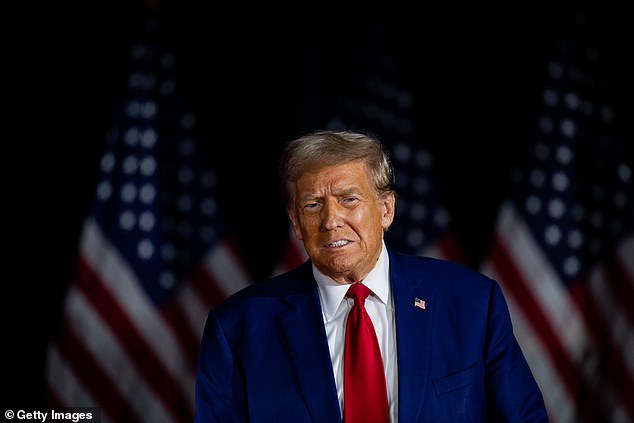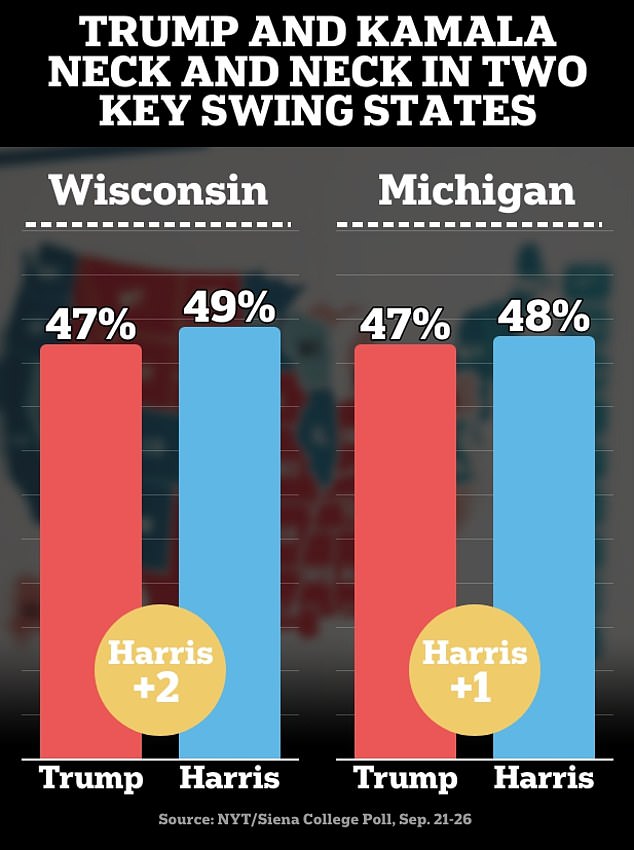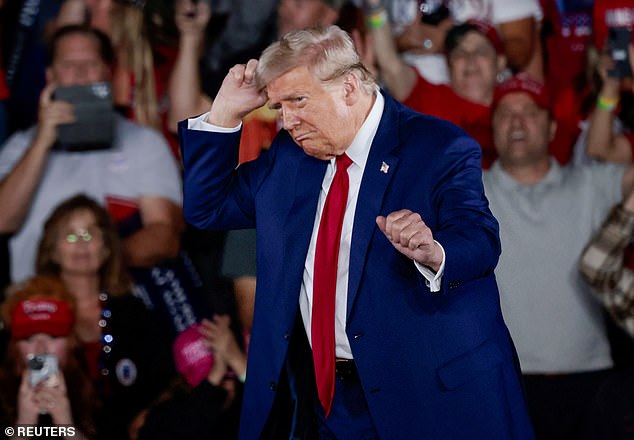Donald Trump and Kamala Harris are neck and neck in two key swing states, shocking new poll reveals
A shocking new poll showed Donald Trump and Kamala Harris neck-and-neck in two key swing states that will decide the race for the White House.
With just seven weeks until Election Day, Harris leads Trump by one point, 48 percent to 47 percent, in Michigan, and by two in Wisconsin, 49 percent to 47 percent, according to a New York Times/Siena College poll.
The poll shows support for Harris has fallen slightly as her momentum after replacing President Biden at the top of the Democratic ticket has seemingly waned.
In particular, the vice president’s perceived weakness on the economy compared to Trump was cited as a driving factor for her decline, and could impact electoral races that lean Democratic but showed support for Trump.
Vice President Kamala Harris has a razor-thin lead in Wisconsin and Michigan with seven weeks until Election Day, according to a new poll

Trump is seen by voters as stronger than Harris on the economy, but is losing support on the politically vulnerable issue of abortion
Notably, the poll found that both Harris and Trump’s levels of support were within the margin of error, leaving them essentially tied in Michigan and Wisconsin, which combined for 25 electoral college votes.
Wisconsin was won by less than one point in four of the last six elections, while Joe Biden won Michigan by just three points in 2020.
The two states are among just a handful of states that will decide the election, with Harris consistently leading national polls but disadvantaged by the Electoral College.
Although Ohio is not considered a battleground state, the poll also focused on voters in the state to show how the presidential race is impacting ballot elections as it hosts one of the most competitive Senate battles in November.
It showed that incumbent Democratic Senator Sherrod Brown has a four-point lead over Republican opponent Bernie Moreno, despite Harris losing to Trump by six points.
The result shows a troubling divide among voters who are open to supporting Democratic candidates but have not chosen Harris in the presidential race.

40-year-old Wisconsin voter Antonio Dawkins told the New York Times that he was among those who planned to vote on state races in the election but was unconvinced in the presidential race, saying he would line could be left blank.
“She’s taking the car salesman talk and trying to sell everyone that she’s not Trump, and that’s not enough,” Dawkins said.
‘She says a lot of things that sound good, without details. So I guess that’s what they call it: there’s no meat and potatoes.’
When asked about the candidates’ policy platforms, voters went five points (46 to 41) toward Trump, whose policies would likely help them personally.
However, when asked which candidate they trusted most to “help people like you,” voters gave Harris a slight edge, showing a disconnect between the candidates’ perceived personalities and their platforms.
In Wisconsin, 55 percent of “undecided” voters cited Trump’s behavior, temperament and honesty while in office as their top concern in potentially supporting the former president, and in Michigan that number was 47 percent.
Voters also said the economy was the most important issue to them ahead of the election, while abortion came in second – an issue seen as politically vulnerable for Trump.

Harris, seen on a visit to the southern border this week, was seen by voters in the poll as more trustworthy on the economy but lost support when it came to specific policies.
Abortion appears to be growing in the consciousness of Americans with seven weeks left before ballots open. 18 percent say this is their main reason for voting, compared to 13 percent when the same pollster asked in May.
On abortion, voters in Michigan supported Harris over Trump by 20 points and in Wisconsin by 13 points.
With poll after poll showing the presidential race will be a nail-biter, forecasters have warned there is a possibility that a single congressional district in Nebraska will play the deciding role.
In an unlikely but statistically possible scenario, Harris and Trump could both struggle to reach the 270 Electoral College votes needed to win, and Nebraska’s slightly different system for awarding votes could make the difference.
Nebraska, along with Maine, is one of only two states that apportion electoral votes by congressional district, with all others having a winner-take-all system.
Under Nebraska’s current system, Donald Trump will almost certainly win four of the state’s five electoral college votes, while the Democratic-leaning Omaha district could offer Kamala Harris one electoral college vote.

A majority of undecided voters in Wisconsin cited Trump’s behavior, temperament and honesty while in office as their top concern in potentially supporting the former president.
In the New York Times/Siena College poll, Harris had a strong nine percent lead in that district, while Trump is expected to easily win the statewide race.
The same result occurred in the 2020 election, where Joe Biden received a vote in the Electoral College despite losing the state by more than 19 points.
For a presidential candidate to win the presidency under the electoral college, he must receive at least 270 votes.
If neither party does so, the fate of the nation will be in the hands of the House of Representatives, which awards votes based on the support of each state delegation rather than the total number of members of Congress who vote.
This would almost certainly give Trump a second term in the White House, as Republicans control more delegations in the House of Representatives.
Omaha’s outstanding vote in the electoral college could become of national importance if Harris wins the ‘Blue Wall’ – Pennsylvania, Michigan and Wisconsin – but loses the other swing states Nevada, Arizona, Georgia and North Carolina.
In that case, the one electoral college vote would be the difference between a 269-269 tie and a Harris victory 270-268.
